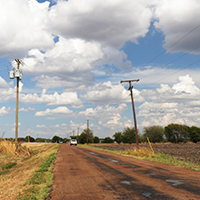Grant Brings Help to Rural Families of Children with Autism
Rural families of children with autism spectrum disorder have a long way to go to find services.
Through a $278,000 grant from the Texas Higher Education Coordinating Board, Baylor School of Education will bring services for children with autism spectrum disorder (ASD) to rural families who might otherwise be unable to obtain help. Through tele-health technology, trained therapists will work with parents and families to help them reach behavior goals for their children.
"Families in rural areas often don’t have access to specialists," said Dr. Stephanie Gerow, assistant professor in the SOE's Department of Educational Psychology. "If they are receiving services, they are driving an hour or two. The distance between the family and the help they need can be prohibitive."
A board-certified behavior analyst (BCBA), Gerow has always included parents in her work with children with ASD. Typically, a BCBA works one-on-one with a child, identifying the motivation for a problem behavior or developing a plan to teach new skills. If parents consistently implement the same strategies at home, it is much more effective, Gerow said.
Behavior goals for children with ASD can range from increasing a desired behavior, like learning to independently brush their teeth or tie their shoes, to correcting a problem behavior, such as behaving appropriately during trips to the grocery store or restaurant.
Gerow said that Baylor SOE's research team has experts in multiple areas. Dr. Tonya Davis, who is co-principal investigator with Gerow, specializes in problem behaviors, while Dr. Jessika Akers focuses on development of social skills. Expertise in assessments will come from Kristen Padilla-Mainor, director of the Baylor Center for Developmental Disabilities.
Through the grant, Baylor researchers and graduate students will work with 100 parents over two years, interacting with them through online video conferencing.
Before beginning, Gerow and the Baylor team will develop a manual for use by therapists. Parents will implement the strategies in homes with their children, with coaching from a therapist. Gerow said experience has taught her that parents are eager to follow through. Early in her career, Gerow developed a self-monitoring worksheet for a parent to fill out. "Honestly, I didn't know if she would do it," Gerow said. "But she had the entire sheet filled in and covered with notes. She practiced the intervention so many times, and the child made greater improvements. When the parent learns how to implement the strategies, the child makes more progress."
Direct video conferencing sessions with families will begin in January of 2019. As they work with each set of 10-15 families, researchers will revise the therapist manual. After completion of the grant, the manual will provide a research-tested tool for replicating the program anywhere, Gerow said, bringing help to countless rural families whose children have ASD.
* This work was supported in whole or part by a grant from the Texas Higher Education Coordinating Board (THECB). The opinions and conclusions expressed in this document are those of the author(s) and do not necessarily represent the opinions or policy of the THECB.
